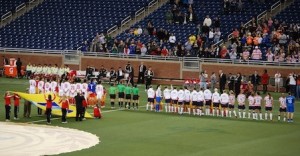
Guest Post by Sophie Alegi
11-year-old soccer player and writer in Michigan. This is her first match report.
December 8, 2012
Detroit –17,371 people came to Ford Field to watch USA vs. China: an attendance record for a women’s soccer game in Michigan.
The US was not used to the artificial surface. Players struggled to control the ball. The surface was clearly not appropriate for soccer because when they passed the ball, it bounced up and down slightly, as if the carpet was ruffled.
China’s defense was shaky in the first five minutes, letting at least six shots be hammered at their goalkeeper, Zhang Yue. The best chance was for Amy Rodriguez who was playing in her 100th international match. China let the US pin them down in their own half. But the Chinese pulled together, playing tight defense.
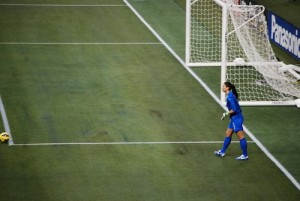
All of the players were extremely close together; making it very difficult for the US to connect their usual passes. The US started to look a little wobbly in the back, with Shannon Boxx giving up ball after ball in the defensive third. Hope Solo managed to keep out a powerful shot by the Chinese number ten with a spectacular aerial save.
In the midfield, the US gave up at least ten balls, giving China easy opportunities to go forward. But the US defense held up, and only a few shots were directed at Solo.
Unfortunately, the two times the ball went down the wing Megan Rapinoe failed to get the ball to Abby Wambach’s head. China started to get physical about eighteen minutes into the half. Every time an American player turned, she would get brutally fouled. It hurts to fall on that carpet surface!
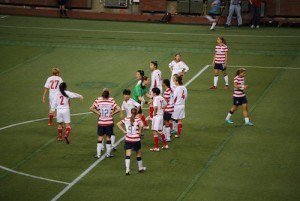
Twenty minutes in, a Chinese player got a yellow card. On the resulting play, Wambach received a cross. The ball glanced off her head and out. She probably wanted that one back. The young Chinese team did well to close up the gaps, but the US team was playing at the speed of molasses.
Thirty minutes in the US began to play in the Chinese penalty box. They would pass around on the outskirts, trying to find an opening. The referee was not very good. She botched a corner kick call and awarded a goal kick instead. A corner was awarded to the US thirty-one minutes in. Wambach got clattered on the back post by a giant Chinese defender.
Author: Editor
Come on Michael! The American De Rossi
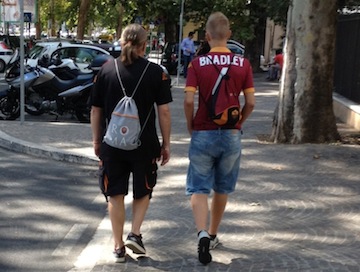
Guest Post by “Er Prof”
Dear friends, unfortunately last week I could not post my comment on the match in Turin, but I can confirm that there are still clouds over the capital. It looks like there are few players who cannot accept Zeman’s ideas and on Sunday the great majority of us at the Stadio Olimpico were speechless when De Rossi and Osvaldo were both left on the bench. We are talking about two Italian internationals, one the top goal scorer and the other “Capitan Futuro,” who will inherit the captaincy when Totti retires. If you need a comparison it is like leaving Pirlo and Vucinic out of Juve’s starting eleven.
The first 20 minutes of the match with Atalanta were horrible for the giallorossi with plenty of chances for the black and blue from Bergamo, one of the Northern cities where the hate against Rome is more visceral. We luckily survived, thanks to the crossbar and three great saves by Stekelenburg. AS Roma finally started playing better and by the end of the first half we were in front thanks to a great pass from Totti (a little spoon pass) to Erik Lamela, the Argentinian striker who softly pushed the ball into Atalanta’s goal. Destro nearly scored a second, but he smashed the cross bar. Then Lamela was fouled inside the box, but the referee had his eyes closed so the first half ended 1-0.
During the second half AS Roma played calmly and without giving space to the opponents. Michael Bradley, back from injury, grew in confidence until he scored the second on an easy ball after a shot from outside the penalty area. Atalanta then seemed to have drawn level, but the referee (wrongly) disallowed it for offside. I ran away from the Olimpico before the end of the match, fearful of watching another victory be senselessly squandered.
I am proud and happy for Bradley who celebrated his first league goal for the wolves right in front of our seats. He played poorly at the beginning of the match, losing possession several times in midfield, but the entire team started with fear in their hearts. Bradley’s performance improved dramatically over the course of the match and I hope he will be on the pitch in Genoa in two weeks time. I remember him from last season’s match in Verona against us; he was one of Chievo’s best players, always fighting and stealing dozens of balls from our midfielders. Now Bradley needs to develop the ability to make the vertical passes crucial for Zeman’s 4-3-3 system to work.
Of course, in Italy soccer is like a religion and so Bradley’s chances of replacing a healthy, in-form De Rossi are almost nil. But Zeman clearly thought Osvaldo and De Rossi were not working hard enough during training, while Bradley showed greater effort and convinced the Bohemian Master. After Sunday’s game, I am confident the American will be a regular choice as one of the three midfielders.
Come on Michael, this is your time!
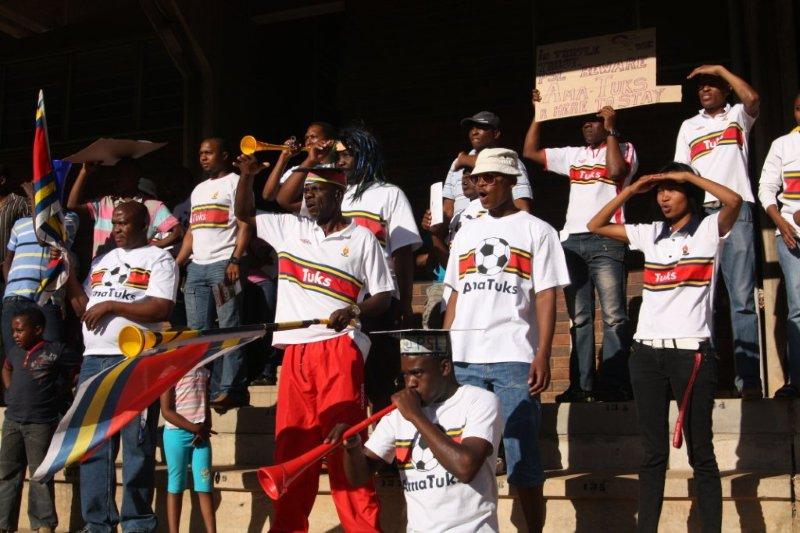
Guest Post by Chris Bolsmann (@ChrisBolsmann)
Four matches into the Premier Soccer League season and newly promoted University of Pretoria remain unbeaten. Even more surprisingly, Tuks, as the university side are known, are second on the table behind South African football giants Kaizer Chiefs. The name Tuks is derived from the institution’s original name: Transvaal University College, established in 1908. During a recent visit back to my hometown of Pretoria I watched Tuks play against city rivals Supersport United at the intimate L. C. de Villers Stadium. The uninspiring derby ended in goalless stalemate. Former national team goalkeeper, Rowan Fernandez pulled off a world-class save in the dying minutes of the game to earn Supersport United a point. This moment of brilliance was his only significant contribution but was enough to earn him the man of the match award.
I was an undergraduate student at the University of Pretoria during the volatile early 1990s. The University of Pretoria was an overwhelmingly white campus during this period with a substantial number of visible and active extreme right-wing students. It was a sign of the troubled times that the fascist Afrikaner Weerstandsbeweging (AWB) essentially barred Nelson Mandela from speaking on campus. My politics classes were attended by students who left leave their 9mm pistols on their desks to either intimidate progressive lecturers or students or both.
Between 1993 and 1998 I also played football for Tukkies in the local amateur leagues. We fielded two teams and were relatively successful during this period. Our home ground was one of two fields in the enormous L. C. de Villers sports complex. Training was on Tuesday and Thursday evenings after lectures and matches on Saturday afternoons. Sunday football was deemed to violate the Sabbath and thus prohibited. The university sporting authorities were passionate about rugby but not particularly interested in football. Rugby was played on many pitches and, of course, in an impressive rugby stadium that could seat 10,000 spectators. Soccer teams weren’t issued the university regulation kit nor were we acknowledged at the end of the year sports functions.
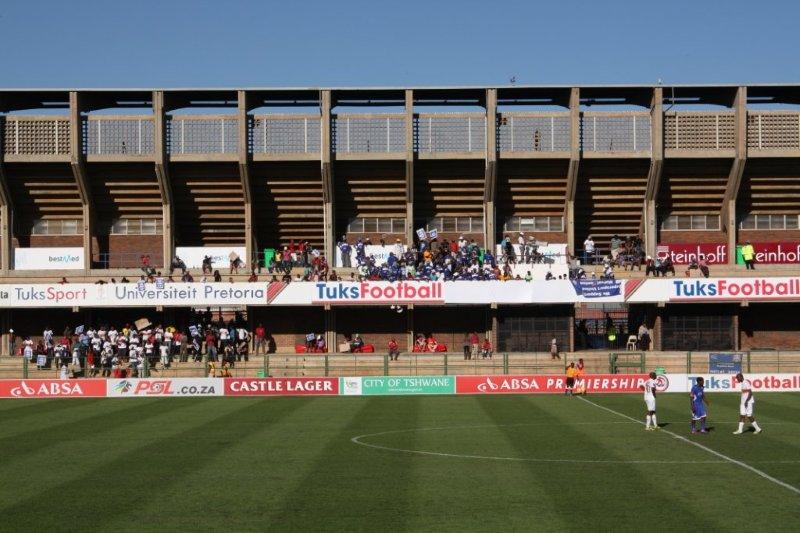
With this history in mind, it was great to watch Tuks play PSL football at the former rugby stadium in front of a small crowd that included many black students. How things have changed at the University of Pretoria! Many of the previously sacred rugby pitches are now football fields; the football club now has teams from under 6 all the way up to the professional team. Moreover, women’s teams and university residential hall teams also play competitively.
Why the university authorities have invested substantial resources into football is perplexing. Tuks football is not a money-making venture since it attracts few paying spectators. My sense is that the University of Pretoria sees a professional football team as a marketing opportunity that helps strategically reposition itself as a premier university for all South Africans. The university has changed from its heyday as the elite training ground for Afrikaner nationalists, but as with many of South Africa’s symbols, what do we make of Tuks’s badge featuring an ox-wagon on their white shirts? Will this powerful symbol of the Boer Voortrekkers of the 1830s be reappropriated and adapted for a new era much like the Springbok survived apartheid to remain the symbol of South African rugby?
Guest Post by Elliot Ross (@africasacountry)
1. This high-stakes knockout format might not be so bad after all. Qualifying groups are long, turgid affairs, especially the European ones, international football’s equivalent of the snoozetastic-but-moneyspinning UEFA Champions League group stages. Knockout football puts the big names at risk, as they should be. This past weekend was joyous.
2. Look out for the central African sides. I reckon DR Congo look a good early outside bet (remember current champions Zambia were 50-1 behind Burkina Faso and Libya before the 2012 tournament) and nobody will want to play Central African Republic — Egypt’s conquerors featured in this video — if Les Fauves manage to hold onto their slender 1-0 lead over Burkina Faso.
3. The Sudanese really know how to celebrate a goal. Watching big Sudan-Ethiopia games feels like being back in the 1950s. All we need is Ad-Diba to turn up with his whistle to referee the second leg.
4. Home advantage is everything. Just ask the Moroccans, the Angolans or the Cameroonians. On the flip side, it means all three of those teams will hold out hope of turning their ties around in October. It also means that despite their recent struggles Bafana Bafana can’t be discounted as serious contenders when South Africa host the tournament early next year.
5. Cabo Verde could have a big future in the African game, especially if they can prevent their top players from representing Portugal and other nations.
6. As Jonathan Wilson (@JonaWils) points out, Cote d’Ivoire’s defence looks a bit dodgy. Kolo Toure is seriously slowing down these days and former Dunfermline Athletic stalwart Sol Bamba might be a favourite of Sven Goran Eriksson, but he’s not the most positionally sound. Thankfully, Eboué has been restored by Sabri Lamouchi at the expense of the clunking Gosso. Hopefully, Seydou Doumbia will be next.
7. Papiss Demba Cissé is a genius. As the video above shows, the Senegalese striker scores goals most players wouldn’t dream of attempting.
8. Zambia have to be very careful in their second leg in Kampala. That encounter is going to be tense, and I’ve got a hunch Uganda will do a number on the African champs.
9. I miss Samuel Eto’o. What’s the price for his dramatic return in the second leg? If Eto’o does not show, then Cameroon look doomed. Whatever the internal drama behind this years-long row, it’s a dispute between a handful of soon-to-be-forgotten officials and one of Africa’s greatest footballers ever, and the result is to that a huge chunk of international matches is missing from his career and Cameroon are absolutely hopeless.
10. Remember the name: Christian Atsu. Is he the Ghanaian Messi? We don’t know but he looked tasty against Malawi and Porto’s scouts really know talent when they see it.
Looting San Siro
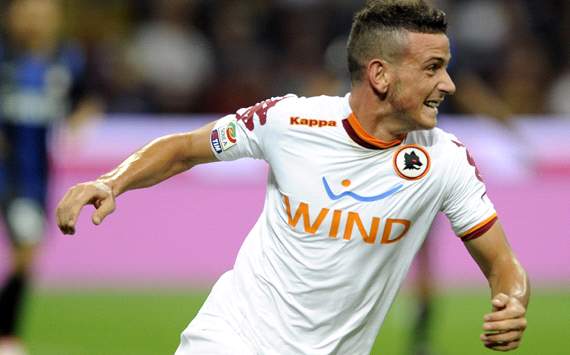
Guest Post by “Er Prof”
My friends,
AS Roma was magnificent in Milan: glory, glory AS Roma!
Italian football’s Jedi, the holy man Zdenek Zeman, is now recognized as The Master not only in Rome, but in all of Italy. La Gazzetta dello Sport, the pink sports newspaper printed in Milan, which is, sadly, the most important Italian daily in terms of sales, is asking Andrea Stramaccioni, the youngest Italian coach now sitting on the Inter Milan bench, to learn the lessons imparted by Zeman’s AS Roma 3-1 thrashing of the nerazzurri on Sunday night.
The match wasn’t the typical Zemanian all-out assault I was used to watching 13 years ago during the Bohemian’s last stint as AS Roma manager. Sure, Inter’s Europa League qualifier on Thursday, which they played with only ten men for most of the game, partly explains their loss of pace in the second half. But the most important revelation of the game came from AS Roma’s new players, some of them very young and playing for the first time at the San Siro/Meazza, also known as “La Scala” of Italian soccer.
With AS Roma depleted in midfield — De Rossi came off after half an hour, Michael Bradley is out for a month, and Pijanic watched from the bench — the Greek Panagiotis Tachtsidis and the Rome-born wonder Alessandro Florenzi (both age 21) turned in amazing performances. They are two hugely promising young midfielders I was really curious to watch. Remarkably, instead of being intimidated by the grand San Siro stage, they played without any hint of fear. Both of them ran from the first minute to the last second of injury time. Florenzi, Tatchidis and Marquinho were more than mere replacements: incredibly efficient, they covered the entire pitch, giving space and opportunities for Totti to unleash the great Osvaldo and wreak havoc on the Inter defense.
Totti was incredible, heroic. He served a terrific cross that Florenzi (in photo above) headed in for the first goal and then midway through the second half dished a wonderful assist to Osvaldo, who spooned it over the keeper to score the second. Marquinho, De Rossi’s substitute, finished Inter off with a great goal nine minutes from time. Meanwhile, Inter had equalized without merit through a deflected shot by Cassano right before the halftime break. The only negative news came from Mattia Destro, the 21-year-old striker making his debut with the giallorossi. The tenacious marking of Nagatomo stifled him, the Japanese being one of the few Inter players able to do something against the mighty AS Roma.
In the end, the match stood out as a lesson in tactics from the oldest serie A coach to the youngest. As I look forward to the match against Bologna at the Olimpico this weekend, my ears are still ringing with the chant of AS Roma supporters on the San Siro terraces: “Corete, scappate, ariva lo squadrone gialllorosso, giallorosso” (run, flee, the great yellow-and-red team is coming; video sample here).

Guest Post by “Er Prof”
ROME–This past Sunday at the Stadio Olimpico I screamed in honor of Michael Bradley’s first serie A match with “La Magica Roma.” I howled so much during the 2-2 draw with Catania that I’m still hoarse three days later.
I am proud to say that I yelled only encouraging, positive things because I had my two boys, Alberto (age 9) and Luca (age 6), with me in the “Family” section of the Distinti Nord. (Long gone are my days with the Commando Ultrà Curva Sud.) In truth, I was also heeding my wife’s warning that if the kids returned home swearing she’d kick me out of the house.
It was so beautiful to see Luca absolutely mesmerized by the stadium atmosphere and the chaos; Alberto got into it too, especially after we drew level and he started believing in a miraculous victory even more than me.
There are at least two ways to comment on what happened in this strange opening game of the 2012-13 season. The first draws on the “dietrologia” (“behindology”) typical of the frustrated Romanista of the post-Capello era: “there you go, Zeman speaks the truth [about corruption and other ills affecting calcio] and those goddamn refs nail us immediately: Catania’s two goals were ludicrously offsides; we were denied a clear penalty; and Osvaldo was, absurdly, deemed offside on a breakaway that would have, surely, resulted in a goal. Two stolen points to keep those Juve bastards calm and content.”
Somehow I managed not to insult the referee for the entire ninety minutes, despite the time-tested knowledge that when in doubt referees always make important calls against us. It may sound like bullshit, but accepting this disgusting (“schifoso”) state of affairs is a big step forward for us as we move towards a different future, one defined by clean, clear, decisive victories achieved in spite of crooked referees.
The second way to reflect on the game is calmer, the kind possible only after the game; it is more focused on the sporting side of things. In the first half, La Roma played like utter shite. The team seemed confused and also intimidated by Catania’s toughness and fitness (a team with nine Argentineans!). Totti and Lamela were almost invisible; Bradley tactically too horizontal; De Rossi couldn’t deliver a vertical pass; and Piris shanked every cross. In the second half, La Roma started playing more seriously, but only through Florenzi and the 19-year-old Uruguayan Nico Lopez did it become truly dangerous. Shortcomings aside, we deserved to win handily. And we would have had it not been for the five officials: five pairs of eyes that managed to miss amazing offsides on Catania’s goals and an incredible handball in their box.
At halftime a child in our section asked his father why we were losing. The man replied with extraordinary wisdom: “because we were born to suffer” (“perchè semo nati pè soffrì”). That was a damn good answer, but the best line may still be the graffiti etched on a wall in our Eternal City: “VIVA LA PAZZA GIOIA D’ESSE ROMANISTIII” (“Long live the crazy joy of being Romanisti”).
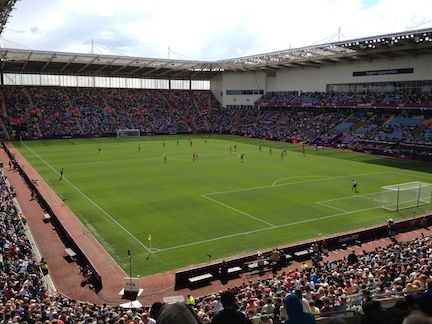
Guest Post by Chris Bolsmann (c.h.bolsmann [at] aston [dot] ac [dot] uk)
After the disappointment of Banyana Banyana’s loss to Sweden (read my post here), I looked forward to the Opening Ceremony of the London Olympic Games and the parade of athletes in particular. The three hour spectacle turned out to be full of contradictions. Danny Boyle provided a fascinating, although selective, history of Britain. He paid homage to the Suffragettes, the National Health Service and immigrants from the West Indies among others, although no reference was made to either slavery or colonialism. I particularly enjoyed his musical selection which included The Jam, Sex Pistols, and The Specials. Watching excited athletes entering the Olympic Stadium can be fun and I was heartened to see Caster Semenya carrying the South African flag.
The lack of visible corporate sponsorship in the stadium and at all Olympic venues is really pleasing to a sports fan’s eye. What a stark contrast to the 2010 World Cup in South Africa where FIFA’s corporate sponsors were visible everywhere. I have yet to come across the Olympics “brand police,” unlike in South Africa where fans wearing Orlando Pirates and Kaizer Chiefs replica shirts emblazoned with the Vodacom sponsor were told to cover them up because MTN — a rival telecom firm — was a national FIFA corporate partner.
Despite the International Olympic Committee’s apparent subtlety, one just has to turn over any Olympic Ticket and the IOC’s “Worldwide Olympic Partners” are clearly visible. The usual suspects appear: unhealthy soft drinks, measly hamburgers and the like, but also a multinational chemical company. Athletes seem unhappy with the restrictions placed on them under the IOC’s Rule 40 protecting official sponsors from “ambush marketing.” Given that athletes can even be disqualified for promoting their individual sponsors, South African swimmer Cameron van der Burgh, Africa’s first gold medal winner, must be cautious since he endorses a range of corporate sponsors on his twitter account which are not “Worldwide Olympic Partners.”
So despite the veneer of a corporate-free Olympic Games, the sponsors and their logos are everywhere. Fizzy soft drinks are even sold as “healthy food” alternatives inside Coventry City’s Ricoh Arena, which has been temporarily renamed the “City of Coventry Stadium” for the Games because the Japanese electronic giant is not an official partner of the IOC. Even the toilets are not safe from the IOC’s attempt at cleansing all traces of rival sponsors. The toilet cisterns and hand dryers have their manufacturer’s names covered up!
I got to watch a double header in this sanitised stadium yesterday as Mexico beat Gabon and South Korea defeated Switzerland. At £20 for a ticket, this represented genuine value for money. Match tickets are cheaper than what Coventry City FC charge in the 3rd tier of English football. The 32,000 seater arena was almost full with 28,000 spectators filling the stands. The empty seats, unfortunately, were the best seats available, those on the half way line behind both substitutes’ benches. According to the IOC, these were seats reserved for their “Worldwide Olympic Partners.” A shame. Besides the fans of the teams on the pitch, there were many families with young children, helped by cheaper youth ticket prices and the Sunday afternoon kickoff time.
As much as I wanted Gabon to silence the Mexican fans’ homophobic chants during opposing goalkeepers’ goal kicks, El Tri were undeniably stronger than their West African counterparts. In an evenly contested first half, Mexico had a couple of good opportunities, but Didier Ovono in the Gabonese goal was equal to the task. The introduction of Giovani dos Santos in the second half gave the Mexicans more creative options up front and he latched onto a long ball in the 62nd minute to put Mexico in front. Giovani sealed the game in the 90th minute after Gabon conceded a late penalty.
Football at the Olympics is different from the World Cup. The kits are different as the German manufacturer is not permitted to advertise their stripes. Football federation logos are replaced by national Olympic associations And for the men, 15 of the 18 members of the team are under 23 years of age. But one just has to look to the corner flags where FIFA has printed its logo and up to the official flags where the IOC’s flag hangs next to that of FIFA. In the end, the corporate interests of the IOC and FIFA merge.